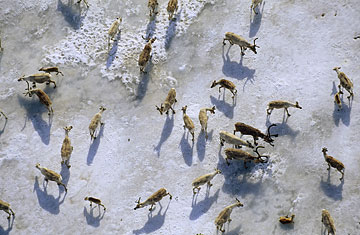
A caribou herd on the tundra
(3 of 3)
To Shell, the multinational oil company that has taken the lead on exploring Alaska's offshore territories, such fears are overblown. Shell officials point to the many exploratory wells that have already been drilled in the Beaufort and Chukchi Seas without incident, and the company's success in keeping discharges in its offshore facilities in the Gulf of Mexico to a minimum, even during Hurricane Katrina. Shell acknowledges that a full-scale operation in the Arctic won't be risk-free, but the company has been drilling in Alaska's Cook Inlet for years without a catastrophe. "It's different than the Arctic, but it's every bit as challenging," says Peter Slaiby, the general manager of Shell Alaska. "When we go up there we'll be ready to address any oil spill from the moment we're on the ground."
Environmentalists, though, worry that the fragile Arctic and sub-Arctic environments could be damaged even if no oil is ever spilled. The polar bear, newly listed as threatened under the U.S. Endangered Species Act, roams the sea ice that forms each winter on the Beaufort and Chukchi Seas, and bear populations are shrinking due to the impact of global warming on their habitat. The roads and pipelines and pumping stations that would inevitably accompany offshore oil development could put even more pressure on the animals. "The sea ice is already being hammered by global warming," says Margaret Williams, the managing director of the Bering Sea and Kamchatka program for the WWF. "If you explore for oil and natural gas, and add the disturbance of infrastructure, the Arctic is being hit with a triple whammy."
These fears are being acknowledged. In April, a U.S. court threw out a plan put forward by the Bush Administration to develop Alaska's offshore oil and gas on the grounds that the Department of the Interior — charged with regulating fossil-fuel development — had failed to properly consider the environmental sensitivity of the areas. Ken Salazar, President Barack Obama's Interior Secretary, has suspended new offshore leases, and seemed receptive to local concerns when he recently visited the Bristol Bay area. "Just Salazar coming here spoke volumes, and gave us hope that our voices will be heard," says Ralph Anderson, the head of the Bristol Bay Native Association.
In the Balance
in the long run, the bering, beaufort and chukchi Seas will be at increasing risk for a simple reason: economics. Even at the lower end of estimates, untapped oil deposits off Alaska's coast could be worth more than $1 trillion. The International Energy Association predicts that, barring major policy changes, global demand for oil will rise from 85 million barrels a day to 106 million barrels a day in 2030. That oil will need to come from somewhere, and in the U.S. that somewhere is likely to include Alaska. America can choose to forgo developing the state's offshore resources — although the public outcry over high gas prices last year shows how politically difficult that will be — but then it will just need to buy its oil from somewhere else, where environmental regulations might be weaker. "Offshore is needed to get the U.S. off foreign oil," says Marilyn Crockett, the executive director of the Alaska Oil and Gas Association. "We should be doing everything we can to reduce that dependence." Says Itta, the North Slope Borough mayor: "I do fear that a choice might be inevitable, and I'm not sure what the right one is. It's the kind of choice that wakes you up at 3:30 in the morning and you can't get back to sleep. How the hell do you balance it?"
It's a troubling question to ponder on a flawless afternoon as I sail past the crumbling glaciers of Prince William Sound, looking for traces of an accident that occurred 20 years ago. The taint of the Exxon Valdez has largely been dispersed. The sound, and the animals and people who live here, have recovered. Still, there's a lingering sense that paradise has been forever stained — and within that loss is a growing understanding that as long as we rely on oil, we'll never be free of the shadow of the Exxon Valdez. Riki Ott, the Prince William Sound biologist, fisherman and author, has traveled around the U.S. for the past few years as a public speaker, telling anyone who'll listen about how her home was harmed by the spill. She still holds out hope that the accident can change people's attitudes. She hopes, even, that a shift is already under way. "When I talk to people, they're not saying that they need more oil," Ott says. "They want a sustainable future for themselves and their kids." We're a long way from such a future. But it's one worth hoping for.